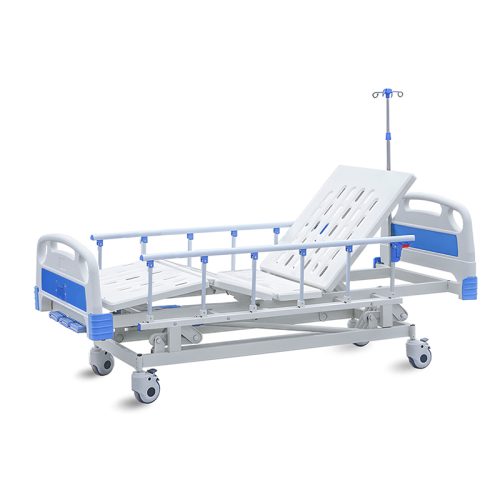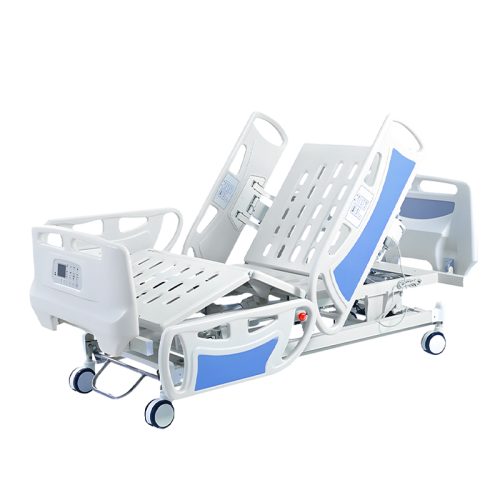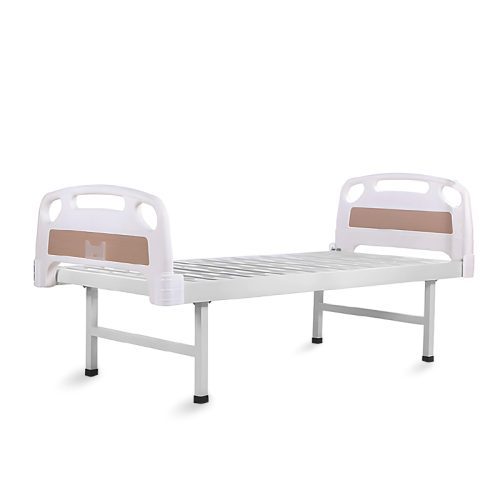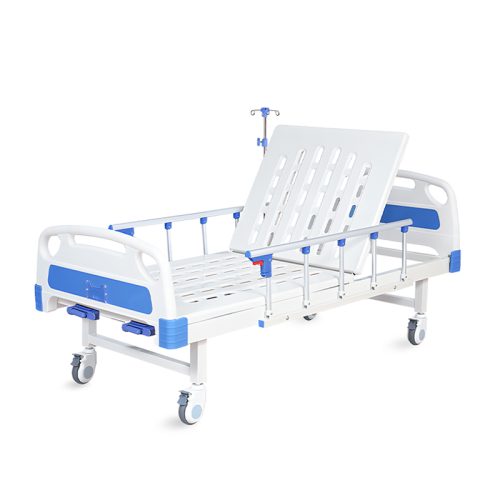
- سرير المستشفى
الدليل الشامل لاختيار سرير مستشفى لعلاج البدانة في 2025
- بواسطة كيلينج ميديكال
ما هو سرير مستشفى لعلاج البدانة؟
تُعد أسرّة المستشفيات المخصصة لعلاج البدانة بمثابة أسرّة متخصصة مصممة للمرضى ذوي الأوزان الكبيرة التي تتراوح أوزانهم بين 500 و1000 رطل. تعزز المواد شديدة التحمل هذه الأسرة التي تشتمل على إطارات أعرض لتوفير دعم وراحة أفضل. تستخدم مرافق الرعاية الصحية وأماكن الرعاية المنزلية هذه الأسرّة لدعم المرضى الذين يحتاجون إلى مساعدة إضافية بسبب وزنهم أو حالات طبية معينة.
تتميز أسرّة علاج البدانة بسعة وزن أعلى مقارنةً بأسرّة المستشفيات العادية.
يتيح تصميم الإطار العريض للمرضى الاستمتاع بمساحة كافية للراحة المريحة.
تحقق هذه الأسرة متانة معززة من خلال المواد شديدة التحمل التي تطيل عمرها الافتراضي.
فوائد أسرّة مستشفيات علاج البدانة
توفر أسرّة مستشفيات علاج البدانة مزايا متعددة يستفيد منها كل من المرضى ومقدمي الرعاية. فيما يلي بعض المزايا الرئيسية:
يتيح الجمع بين الإطار العريض والمواد المعززة للمرضى الراحة بشكل مريح دون الشعور بالضيق أو عدم الدعم.
تتميز أسرّة علاج البدانة بتصميمات تقلل من مخاطر الانقلاب أو الانهيار وتحمي كلاً من المرضى ومقدمي الرعاية من الحوادث المحتملة.
تعمل المراتب المتخصصة الموجودة في العديد من أسرّة علاج البدانة على توزيع وزن الجسم بالتساوي لتقليل فرص الإصابة بقرح الضغط.
تمكّن أسرّة علاج البدانة القابلة للتعديل مقدمي الرعاية من تغيير وضع المرضى بسهولة، مما يساعد على منع الإصابات التي يتعرض لها كلا الشخصين.
تساعد ميزات الارتفاع والوضعية القابلة للتعديل للأسرّة المرضى الذين يعانون من صعوبات في الحركة على الدخول والخروج من أسرتهم بأقل جهد.
أنواع أسرّة مستشفيات علاج البدانة
توجد أنواع متعددة من أسرّة المستشفيات لعلاج البدانة لتلبية متطلبات معينة. يقدم هذا القسم نظرة عامة مفصلة على أنواع الأسرة الشائعة.
تعمل أسرّة السمنة الكهربائية بالطاقة الكهربائية وتتميز بقدرات التحكم عن بُعد للسماح بإجراء تعديلات بسيطة. يجب على المرضى الذين يحتاجون إلى تغيير وضعيتهم بشكل منتظم أو الذين يعانون من صعوبة في الحركة التفكير في هذه الأسرّة.
يتطلب ضبط أسِرَّة علاج البدانة اليدوية استخدام إما ذراع تدوير أو رافعة. تحتاج أسرّة علاج البدانة اليدوية إلى المزيد من الجهد اليدوي ولكنها تظل أكثر اقتصاداً ومناسبة للمرضى الذين يحتاجون إلى الحد الأدنى من التغييرات في الوضعية.
تسمح أسرّة علاج البدانة ذات الارتفاع المنخفض للمرضى بالدخول والخروج بسهولة لأنها تجلس بالقرب من الأرض.
توفر أسرّة السمنة المنفصلة تحكماً فردياً لكل جانب من جانبي السرير مما يجعلها مثالية للأزواج الذين لديهم تفضيلات نوم مختلفة.
ميزات مهمة يجب فحصها عند اختيار سرير مستشفى لعلاج البدانة
يتطلب اختيار سرير المستشفى المناسب لعلاج البدانة تقييم العديد من الميزات المهمة لتلبية متطلباتك الخاصة.
يجب أن يتحمل السرير أحمال وزن المريض بأمان بسعة تتراوح بين 500 و1000 رطل.
عند اختيارك لسريرك اختر سريراً مزوداً بميزات قابلة للتعديل في الرأس والقدم والارتفاع لتوفير أقصى درجات الراحة.
يعمل جهاز التحكم عن بُعد على تبسيط عمليات ضبط السرير ويغني عن الحاجة إلى الانتقال من مكانك أو طلب المساعدة من شخص آخر.
تساعد القضبان الجانبية على منع المرضى من التدحرج من السرير من خلال توفير المزيد من الأمان.
توفر عجلات القفل تثبيتاً آمناً لإبقاء السرير ثابتاً عند الضرورة.
اختر مرتبة مصممة خصيصاً لأسرّة علاج البدانة لتوفير الدعم اللازم وتخفيف الضغط.
يتطلب اختيار سرير المستشفى المناسب لعلاج البدانة إجراء تقييم شامل لمتطلبات المريض والحدود المالية وإعدادات الرعاية.
يتضمن اختيار سرير المستشفى المناسب لعلاج البدانة تقييم متطلبات المريض مع الموازنة بين القيود المالية واعتبارات بيئة الرعاية. ستساعدك هذه النصائح في اختيار سرير المستشفى المثالي لعلاج البدانة.
يجب أن يؤثر وزن المريض ومستوى حركته وحالته الطبية على اختيارك لسرير علاج البدانة.
نظراً للاختلافات الكبيرة في الأسعار بين أسرّة المستشفيات المخصصة لعلاج البدانة، يجب عليك تحديد ميزانيتك قبل شراء سرير.
تأكد من أن السرير الذي اخترته يتناسب بشكل جيد مع مساحتك، مع إيلاء اهتمام خاص للموديلات منخفضة الارتفاع أو المنقسمة.
من الأفضل تجربة أسرة السمنة المختلفة جسدياً قبل الاختيار لضمان الراحة الشخصية.
تحقق من تقييمات العملاء لتقييم جودة السرير ومتانته وأدائه.
نصائح للحفاظ على سرير مستشفى لعلاج البدانة
للحفاظ على وظائف سرير المستشفى لعلاج البدانة وطول عمره الافتراضي، تحتاج إلى إجراء الصيانة المناسبة. ستساعدك هذه النصائح في الحفاظ على سريرك في حالة ممتازة.
التنظيف الروتيني لهيكل السرير والمرتبة يمنع تراكم الأوساخ والبكتيريا.
افحص سريرك بشكل دوري بحثاً عن أي مؤشرات تلف بما في ذلك البراغي المفكوكة أو الأسلاك الكهربائية المهترئة.
التزم بإرشادات الشركة المصنعة للاستخدام والصيانة للحفاظ على حالة الضمان.
يساعد التدوير المنتظم للفرشة على توزيع التآكل على كامل السطح مما يطيل من عمرها الافتراضي.
يجب على المرضى الابتعاد عن هذه الأخطاء النموذجية عند اختيار سرير مستشفى لعلاج البدانة. سيؤدي اختيار سرير المستشفى غير الصحيح لعلاج البدانة إلى الشعور بعدم الراحة والإحباط للمستخدم. إليك بعض الأخطاء الشائعة التي يجب تجنبها:
يحتاج المرضى المختلفون إلى أسرّة تناسب احتياجاتهم الفردية على الرغم من أن السرير الذي يناسب مريضاً ما قد لا يناسب مريضاً آخر. يجب دائماً مراعاة الاحتياجات والتفضيلات الخاصة بكل مريض على حدة.
على الرغم من أن الميزانية مهمة، إلا أن اختيار السرير الأقل تكلفة قد يعني أنه يفتقر إلى الدعم والراحة اللازمين.
تحقق من أن السرير يتناسب مع حدود سعة وزن المريض ومساحة الغرفة مع توافقه مع المرتبة لمنع حدوث مشاكل في التوافق.
يعتمد طول عمر السرير ووظائفه الوظيفية بشكل كبير على جهود الصيانة الدورية. سيؤدي عدم إجراء عمليات التنظيف والفحص الروتينية إلى تآكل السرير في وقت أبكر من المتوقع.
الخاتمة
يُعد اختيار سرير المستشفى المناسب لعلاج البدانة خياراً أساسياً لأنه يؤثر على مستوى راحة المريض إلى جانب سلامته ونتائج تعافيه. يمكّنك فهم أنواع أسرّة علاج البدانة المتاحة إلى جانب ميزاتها الأساسية وإجراءات الصيانة المناسبة من اختيار سرير يلبي متطلباتك الفريدة. إذا كنت تقدم رعاية منزلية لأحد أحبائك أو تدير مرفق رعاية صحية فإن الاستثمار في سرير المستشفى المناسب لعلاج البدانة يساعدك على ضمان رفاهية المريض مع توفير راحة البال.
الأسئلة الشائعة
س: تتراوح سعة وزن سرير المستشفى المخصص لعلاج البدانة عادةً من 500 إلى 1000 رطل. ج: تتراوح سعة وزن أسرّة المستشفيات المخصصة لعلاج البدانة عادةً بين 500 و1,000 رطل.
س: لن تعمل المراتب العادية بشكل صحيح مع أسرّة المستشفيات المخصصة لعلاج البدانة. ج: لا تفي المراتب القياسية بالمتطلبات الخاصة بأسرّة علاج البدانة. اختر مرتبة تفي بالمتطلبات الخاصة بأسرّة علاج البدانة.
س: هل أسرّة مستشفيات علاج البدانة مغطاة بالتأمين؟ ج: قد يقدم مزودو التأمين تغطية لأسرّة المستشفيات لعلاج البدانة عند ثبوت الضرورة الطبية. راجع مزود التأمين الخاص بك للحصول على التفاصيل.
س: ما هو النطاق السعري لسرير مستشفى لعلاج البدانة؟ ج: تؤدي الأنواع والمميزات المختلفة لأسرّة المستشفيات لعلاج البدانة إلى اختلاف أسعارها. عادةً ما تكون أسرة المستشفيات اليدوية أقل تكلفة من الأسرة الكهربائية.
📧 البريد الإلكتروني inquiry@shkeling.com
🌐 الموقع الإلكتروني: www.shkeling.com.cn
نتطلع إلى بناء شراكة ناجحة معك!






